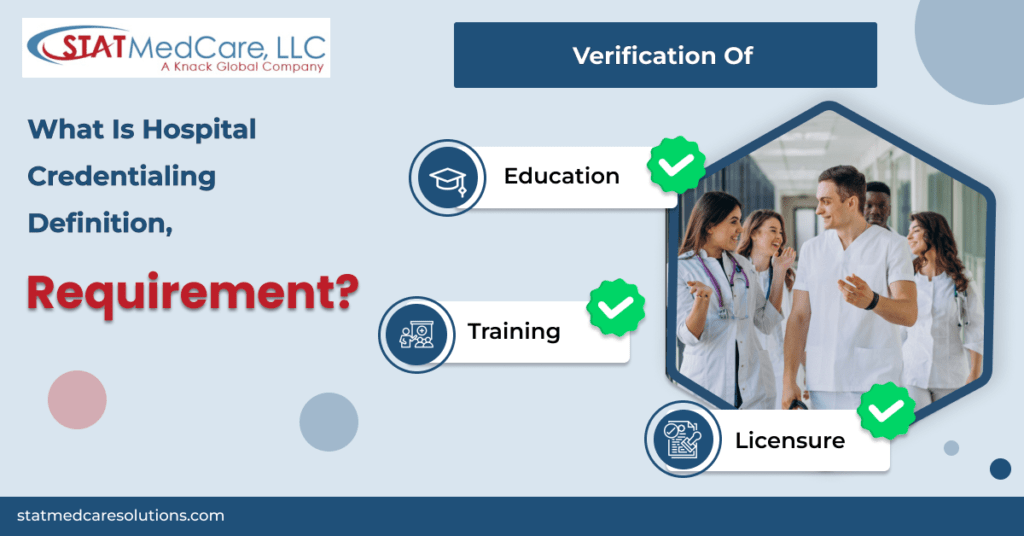
Hospital Credentialing
Hospital credentialing plays a crucial role in ensuring patient safety and maintaining the reputation of healthcare facilities. It involves verifying the qualifications, experience, and competency of healthcare professionals to ensure they meet the required standards. In this blog, we will provide a comprehensive overview of hospital credentialing, its significance, and the essential requirements involved.
What is Hospital Credentialing?
Hospital credentialing is the process of assessing and verifying the credentials of healthcare professionals, including doctors, nurses, and other staff members. It involves evaluating their education, training, licensure, and other relevant qualifications to ensure they meet the necessary standards for providing quality patient care.
The Importance of Hospital Credentialing:
1. Patient Safety: Credentialing helps ensure that healthcare professionals possess the required qualifications and competency to provide safe and effective care to patients.
2. Quality Assurance: By verifying credentials, hospitals can maintain a high standard of care and ensure that only qualified professionals are employed.
3. Legal Compliance: Credentialing helps healthcare facilities comply with industry regulations and legal requirements related to staffing and patient care.
4. Reputation Management: Proper credentialing enhances the reputation of healthcare facilities, instilling confidence in patients and the community.
Steps in the Hospital Credentialing Process:
1. Gathering and Verification of Credentials: Healthcare professionals’ education, training, licenses, certifications, and specialized training are collected and verified for authenticity and relevance.
2. Background Checks: Comprehensive background checks are conducted to identify any history of malpractice, disciplinary actions, or criminal records that may compromise patient safety.
3. Reference Verification: Previous employers, colleagues, or mentors are contacted to gain insights into the professional’s skills, work ethic, and professional conduct.
4. Ongoing Monitoring: Credentialing is not a one-time process; it requires periodic re-verification of credentials, licenses, certifications, and continuing education requirements to ensure professionals maintain their qualifications.
Requirements for Hospital Credentialing:
While specific requirements may vary, common elements include:
1. Proof of Education and Training: Healthcare credentialing professionals must provide evidence of their educational qualifications and any specialized training.
2. Valid Licenses and Certifications: Proof of current and valid licenses and certifications required for their respective roles.
3. Professional Liability Insurance: Healthcare professionals need to provide proof of adequate professional liability insurance coverage.
4. Background Checks and References: Background checks, including criminal records, malpractice history, and reference verification, are essential to ensure patient safety.
Benefits of Partnering with STAT MedCare:
1. Expertise and Knowledge: Professional credentialing firms, like [Your Company Name], have the expertise and knowledge to navigate the complex credentialing process and ensure compliance with industry standards.
2. Time and Resource Savings: Outsourcing credentialing to a trusted firm saves hospitals valuable time and resources, allowing them to focus on delivering quality healthcare services.
3. Regulatory Compliance: Credentialing firms stay updated with evolving healthcare regulations, ensuring hospitals remain compliant with the changing requirements.
4. Streamlined Process: Credentialing firms streamline the credentialing process, reducing administrative burden and ensuring efficiency.
5. Personalized Support: A credentialing firm provides personalized support and guidance throughout the process, addressing concerns and questions promptly.
Conclusion:
Hospital credentialing is a critical process that ensures patient safety, maintains quality standards, and helps healthcare facilities comply with legal and regulatory requirements. By partnering with a trusted credentialing firm like STAT MedCare hospitals can streamline the process, save time and resources, and ensure compliance with industry standards. Proper credentialing is essential for delivering safe and effective care, enhancing the reputation of healthcare facilities, and building trust with patients and the community.





